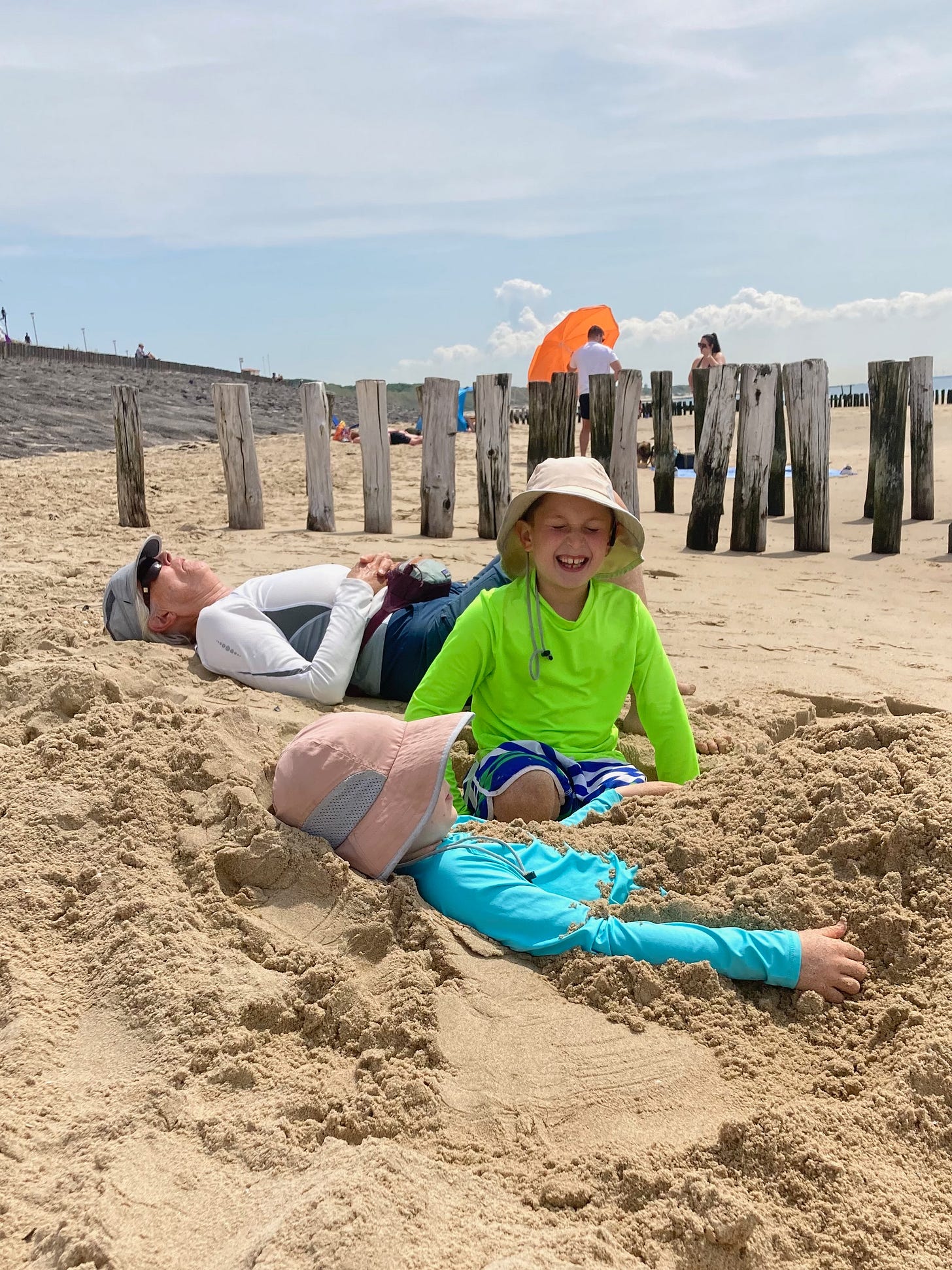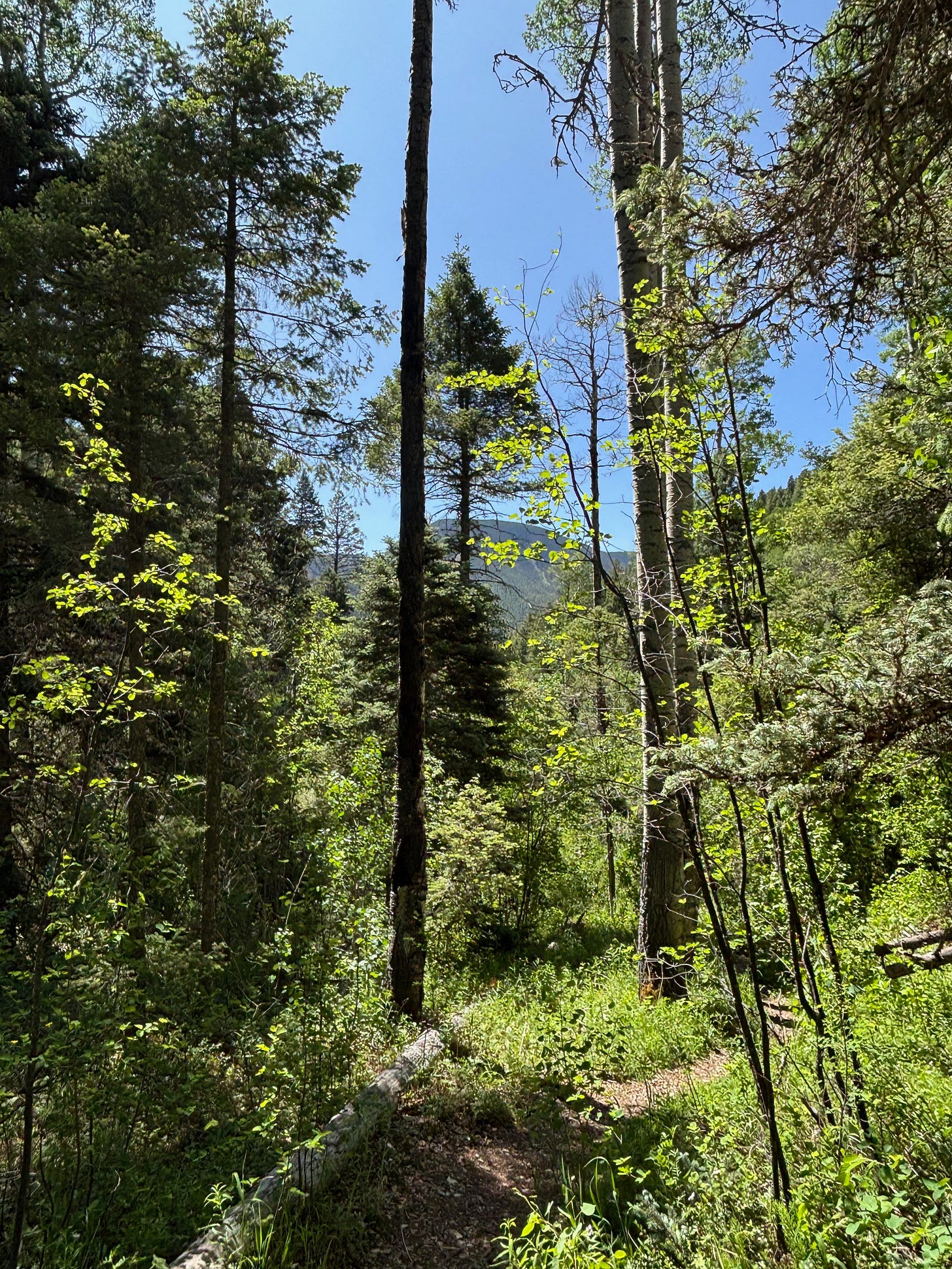The sun felt good on my back at 10:00 AM as I hauled weeds to the compost pile. The morning window of gardening in comfort is getting smaller as we’re moving through the summer solstice. I’m lucky I live with desert lows at night that cool off the house and make the early mornings (65F) and evenings (72) bearable for being outside. Midday finds me in the cool of my home or porch tending to chores and writing. Not everyone is so lucky. The national (and international) heat forecasts are showing temperatures rising to 109 and even 118F (48C) (Phoenix AZ, New Delhi) this weekend. Someone posted a reel about his monthly electrical bill in Texas, 626 dollars to keep his house cool! When the heat comes, people live imprisoned in their homes or miserably outside, vulnerable to heatstroke. I remember being on the hot, humid Indian plain near Lucknow in June 1972, on our way to Delhi and the West. While waiting for a train, we laid in our hotel room with a rinky-dink fan turning around and around to create a breeze. We wore our Indian garb, my boyfriend a lungi, I a large cloth tied on my shoulder, stepped into the shower often to get wet so we’d experience twenty minutes of cool air on our bodies. We spent the day repeating this routine, broken up by a visit to the lassi stand down the street for icecold lassi, (a yoghurt smoothie). Night time was no better. Indians slept on their rooftops to catch a breeze. This continued, we discovered, until the July monsoons. After that brief exposure, I empathize with those enduring annual extreme heat, especially with increasing temperatures.
Globally, most individuals endure extreme summer heat. Parts of Africa, the Middle East, a range of countries in South-East Asia; Europe has its heatwaves, the USA, Middle and South America. Earth is getting hotter. Ancient solstice celebrations, once filled with all-night parties and unending light, are no longer so cheerful. My second wedding happened on the summer solstice. It was a fun party in the meadow of a 40-acre property in N.California where we were living. Last minute, we had to rent an enormous parachute to shade the meadow as the temperatures were rising into the triple digits. You can circumvent the heat. If you can travel, you can find cooler places and escape. Many cannot afford to travel and have to endure. I don’t want to travel to escape the heat. I grew up in a moderate climate and summer travel was a bike ride to the beach. Now, a cool hike in forested mountains is only a half hour car ride away. I can be active outdoors in summer
Will billions in 2050 have adequate outdoor summer space? A map depicting days of comfortable (60-85F) temperatures in the USA shows a small area with over 100 days a year of comfortable temperatures. Will people become more dependent on artificial environments to survive?
https://www.reddit.com/r/MapPorn/comments/1ezeu9j/us_comfortable_te
How will this impact mental wellness? Summer season in the northern hemisphere is the time for recharge, gaining energy, lifting the spirit so we can face winter with more resilience. In tropical places, the change from dry season to wet season provides the uplift, the earth turns green, there’s food for grazing, crops to feed everyone through the dry season. If we cannot get the mental reprieve in our life, we fall into depression and numbness. Lackluster citizens do not produce or participate in society and we become more vulnerable to unfavorable (authoritarian) regimes who tell us that they will fix our problems (LOL).
I don’t want to paint a miserable picture for the Summer Solstice. I want to connect climate with mental health, encourage you to make smart decisions for your future. Where will you live? How do you engage, stay active both physically and mentally? Do you live in a walkable environment? Can you walk, bike, ski outdoors year-round? I wish everyone could have a choice of where they want to live. Migration is as old as people. Animals do it. Native tribes moved around to find food and better living conditions. Now career advancement and fleeing oppression motivate migration. Shrinking habitable space makes migration a struggle for survival.
Unless…. Unless we cut our carbon emissions, walk, bike, use public transportation to get around. Plant trees in cities, create walking/biking corridors instead of car lanes and freeways. It can be done, it’s happening in countries like the Netherlands, Denmark, Austria, Sweden. Regions with pleasant temperatures year-round, although that is changing also. Countries where people take action and fight against the “it will last my lifetime” mindset. Where people build a future. Walking and biking for recreation and health is one thing, but it doesn’t solve the climate crisis. Making it possible and safe to walk or bike to work, the grocery store, the doctor’s office, will encourage a new mind set that can reduce the heat on the planet.

I just got my bike tuned up and can ride to the swimming pool, the doctor’s office, the hardware store, all within a 2-mile radius. I selected this town for its walkability and bike-ability, mirroring my previous lifestyle. This location presents challenges; its summer heat, however, is preferable. When I walk to a neighborhood gathering, people look at me worrisome. “Are you okay? I can give you a ride.” The car mentality is so engrained, it’s hard to break. We have to start somewhere. Consider ways to lessen your environmental impact. Fewer trips by car, maybe? Combining your errands and do them once a week? Carpool when possible. Consider repairing your bike and cycling for errands instead. You will feel better. Roadside wildflowers and the sun’s peculiar angle will be noticeable. Your mental health will improve as you make the effort. Not only is it a hell of a lot cheaper than moving to more tolerable climate, you might even enjoy the sun on your back!
Dami Roelse is the author of several books on walking/hiking and transformational travel: “Walking Gone Wild, how to lose your age on the trail” and “Fly Free, a memoir of love, loss and walking the path”. Her next book, “Body and Grace, a hike to wholeness on the PCT, is forthcoming March 2026 from Mantra Books.




